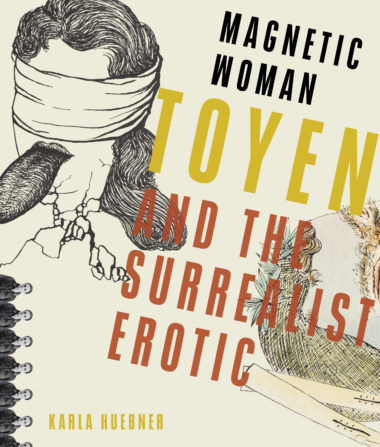Editor’s Note: This exchange is part of a series of brief interviews with emerging writers of recent or forthcoming books. If you enjoyed it, please visit other interviews in the I’ve Got Questions feature.
- What’s the title of your book? Fiction? Nonfiction? Poetry? Who is the publisher and what’s the publication date?
Magnetic Woman: Toyen and the Surrealist Erotic (nonfiction), University of Pittsburgh Press, 22 December 2020
- In a couple of sentences, what’s the book about?
Magnetic Woman is the first book in English to examine the life and work of the artist Toyen (Marie Čermínová, 1902–80), a founding member of the Prague surrealist group. Toyen’s early life in Prague enabled her to become a force in three avant-garde groups—Devětsil, Prague surrealism, and Paris surrealism—yet, unusually for a female artist of her generation, Toyen presented both her gender and sexuality as ambiguous and often emphasized erotic themes in her work.
- What’s the book’s genre (for fiction and nonfiction) or primary style (for poetry)?
Magnetic Woman combines biography and cultural history to illuminate not just the artist but the world of the Prague avant-garde.
- What’s the nicest thing anyone has said about the book so far?
A lot of people have told me they are excited to see this book coming out, but here’s some praise that hasn’t appeared on the book cover or been published yet elsewhere: Alyce Mahon of Cambridge University has said it’s “a major contribution to our study of Surrealism” and Keith Holz of Western Illinois University calls it “everything one could imagine and hope for in a critical study of Toyen, the social circles of the artist, the artworks’ frank and imaginative sexuality, and the societies and the political cultures her engaged life and career spanned … [it] is a gift. … some of the absolute best writing and scholarship in art history on Central Europe appearing today.”
- What book or books is yours comparable to or a cross between? [Is your book like Moby Dick or maybe it’s more like Frankenstein meets Peter Pan?]
I’d like to think that it’s comparable to Janet Kaplan’s Unexpected Journeys: The Art and Life of Remedios Varo and Hayden Herrera’s Frida: A Biography of Frida Kahlo, both of which provide meticulously researched but also wonderfully rich and readable accounts of fascinating women artists who were not all that well known to the public prior to the publication of those biographies.
- Why this book? Why now?
Interest in Czech modernism has been growing worldwide since the fall of communism; while the lively and fascinating Czech avant-garde of 1890 to 1938 was somewhat known to modernists in other countries back then, during the communist era these creators were largely forgotten outside Czechoslovakia. With new awareness in the English-speaking world of these creative figures, the time is ripe to go beyond basic introductions to their work. Also–and I hope the pandemic does not make me a liar–2021 will see the opening of a major Toyen exhibition that will tour from Prague to France, Germany, and the Art Institute of Chicago!
- Other than writing this book, what’s the best job you’ve ever had?
I did really love writing this book—never got sick of the book itself, just the long road to publication—and the other best job I’ve had is being a fiction writer. But being an art history professor, and working in theater years ago, probably come next in line.
- What do you want readers to take away from the book?
I hope that readers will come away with a sense of wonder at the amazing range of work and also the remarkable circle of friends that a young gender-queer artist was able to make in both Czechoslovakia and France nearly one hundred years ago; and to see that this artist was able to become a major figure in both interwar Czechoslovak culture and in the international surrealist movement.
- What food and/or music do you associate with the book?
What a fun question! Well, despite being a near-vegetarian, I enjoy good Czech cooking, so I can imagine that Toyen and friends enjoyed many dishes featuring pork, cabbage, and potatoes, as well as cucumber salad, Bohemian beers, and Moravian wines. Musically, jazz! The interwar Czech modernists tended to be major fans of jazz, and one of the founding Prague surrealists, Jaroslav Ježek, wrote many wonderful jazz compositions in his role as bandleader for the Liberated Theater, as well as writing pieces that are more in the classical tradition. Another composer associated with the Prague surrealist group was the theater director E. F. Burian, and then I would also mention the avant-garde composers Alois Hába (who used quarter-tones), Miroslav Ponc (who experimented with color in connection with music), and Bohuslav Martinů. That’s not to leave out better-known composers like Leoš Janáček (much older but still composing in the interwar years). Or, of course, French modernist composers of the day or the American jazz that inspired European jazz.
- What book(s) are you reading currently?
This is always a tough question because I tend to have a lot of books underway and often they are not at all new, although I want to support new work. I keep dipping into Walter Benjamin’s Arcades Project, and I recently wrote a review of Marta Filipová’s Modernity, History, and Politics in Czech Art for Austrian History Yearbook. In fiction, I’ve been reading Michael Chabon’s Moonglow, Tayari Jones’s An American Marriage, and Diane Setterfield’s Once Upon a River. That’s a long enough list.
Learn more about Karla at her website and her blog.



